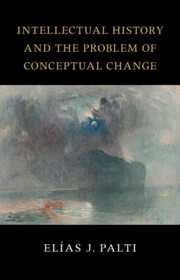Book contents
- Intellectual History and the Problem of Conceptual Change
- The Seeley Lectures
- Intellectual History and the Problem of Conceptual Change
- Copyright page
- Contents
- Preface
- Acknowledgments
- Introduction
- Chapter 1 Pocock, Skinner, and the “Historiographical Revolution”
- Chapter 2 The Republican Genealogy and the Normative Temptation
- Chapter 3 The Problem of Conceptual Change
- Chapter 4 Conceptual History
- Chapter 5 Koselleck’s Begriffsgeschichte
- Chapter 6 Hans Blumenberg and the Theory of Nonconceptuality
- Chapter 7 From Structuralism to Poststructuralism
- Chapter 8 Foucault’s Archaeology of Knowledge
- Chapter 9 The Archaeological Project and the Ignored Epistemic Mutation
- Chapter 10 Behind the Structures and the Subject
- Conclusion
- Epilogue
- Quoted Bibliography
- Index
Epilogue
Navigare necesse est, vivere non necesse
Published online by Cambridge University Press: 02 May 2024
- Intellectual History and the Problem of Conceptual Change
- The Seeley Lectures
- Intellectual History and the Problem of Conceptual Change
- Copyright page
- Contents
- Preface
- Acknowledgments
- Introduction
- Chapter 1 Pocock, Skinner, and the “Historiographical Revolution”
- Chapter 2 The Republican Genealogy and the Normative Temptation
- Chapter 3 The Problem of Conceptual Change
- Chapter 4 Conceptual History
- Chapter 5 Koselleck’s Begriffsgeschichte
- Chapter 6 Hans Blumenberg and the Theory of Nonconceptuality
- Chapter 7 From Structuralism to Poststructuralism
- Chapter 8 Foucault’s Archaeology of Knowledge
- Chapter 9 The Archaeological Project and the Ignored Epistemic Mutation
- Chapter 10 Behind the Structures and the Subject
- Conclusion
- Epilogue
- Quoted Bibliography
- Index
Summary
The expression “navigare necesse est, vivere non necesse” (to navigate is necessary, living is not) is attributed to Pompey by Plutarch, who affirms that the Roman general said it when his sailors, frightened by lightning bolts, refused to embark during the war. Actually, there is something paradoxical in his statement. Traveling could be thought, conversely, as necessary to life and subordinate to it (Pompey’s ship carried wheat, a vital provision for his fellow countrymen). In any case, what this phrase distils is a combination of resignation and defiance: invoking the very act of navigating, instead of that of reaching its end, as an argument to encourage the crew to undertake the journey, that is, to make the trip an end in itself, would be a ruse to ward off uncertainty in the face of an unpredictable destiny.
- Type
- Chapter
- Information
- Intellectual History and the Problem of Conceptual Change , pp. 255 - 266Publisher: Cambridge University PressPrint publication year: 2024

